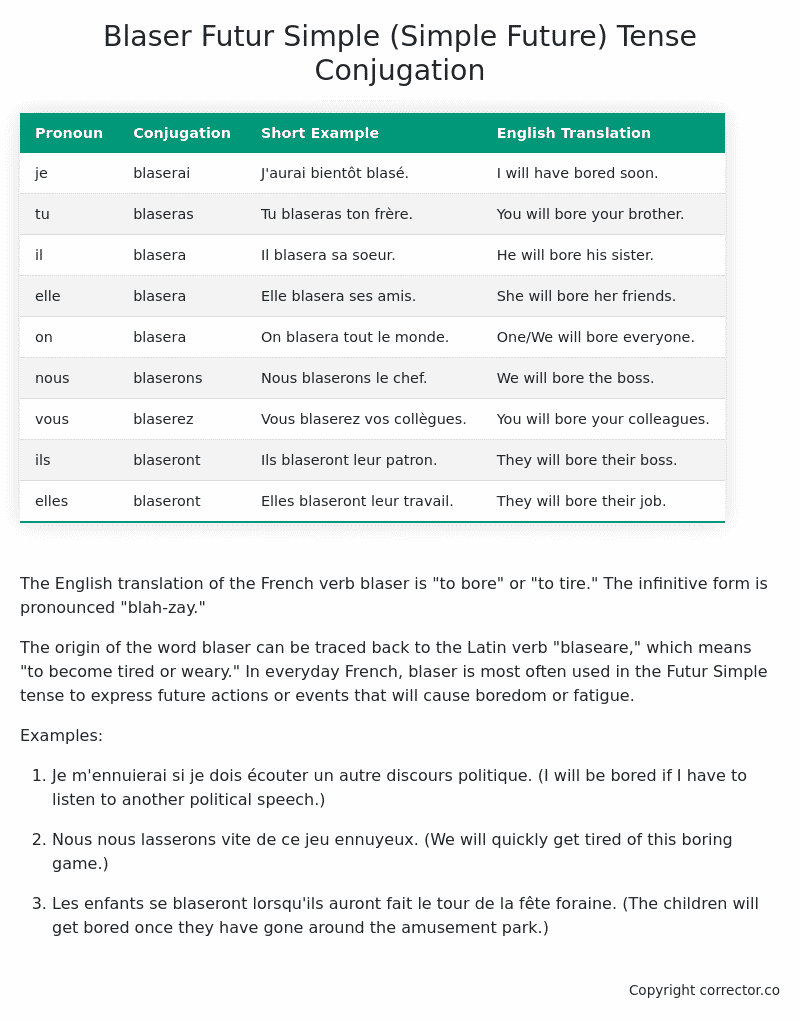Futur Simple (Simple Future) Tense Conjugation of the French Verb blaser
Introduction to the verb blaser
The English translation of the French verb blaser is “to bore” or “to tire.” The infinitive form is pronounced “blah-zay.”
The origin of the word blaser can be traced back to the Latin verb “blaseare,” which means “to become tired or weary.” In everyday French, blaser is most often used in the Futur Simple tense to express future actions or events that will cause boredom or fatigue.
Examples:
-
Je m’ennuierai si je dois écouter un autre discours politique. (I will be bored if I have to listen to another political speech.)
-
Nous nous lasserons vite de ce jeu ennuyeux. (We will quickly get tired of this boring game.)
-
Les enfants se blaseront lorsqu’ils auront fait le tour de la fête foraine. (The children will get bored once they have gone around the amusement park.)
Table of the Futur Simple (Simple Future) Tense Conjugation of blaser
| Pronoun | Conjugation | Short Example | English Translation |
|---|---|---|---|
| je | blaserai | J’aurai bientôt blasé. | I will have bored soon. |
| tu | blaseras | Tu blaseras ton frère. | You will bore your brother. |
| il | blasera | Il blasera sa soeur. | He will bore his sister. |
| elle | blasera | Elle blasera ses amis. | She will bore her friends. |
| on | blasera | On blasera tout le monde. | One/We will bore everyone. |
| nous | blaserons | Nous blaserons le chef. | We will bore the boss. |
| vous | blaserez | Vous blaserez vos collègues. | You will bore your colleagues. |
| ils | blaseront | Ils blaseront leur patron. | They will bore their boss. |
| elles | blaseront | Elles blaseront leur travail. | They will bore their job. |
Other Conjugations for Blaser.
Le Present (Present Tense) Conjugation of the French Verb blaser
Imparfait (Imperfect) Tense Conjugation of the French Verb blaser
Passé Simple (Simple Past) Tense Conjugation of the French Verb blaser
Passé Composé (Present Perfect) Tense Conjugation of the French Verb blaser
Futur Simple (Simple Future) Tense Conjugation of the French Verb blaser (this article)
Futur Proche (Near Future) Tense Conjugation of the French Verb blaser
Plus-que-parfait (Pluperfect) Tense Conjugation of the French Verb blaser
Passé Antérieur (Past Anterior) Tense Conjugation of the French Verb blaser
Futur Antérieur (Future Anterior) Tense Conjugation of the French Verb blaser
Subjonctif Présent (Subjunctive Present) Tense Conjugation of the French Verb blaser
Subjonctif Passé (Subjunctive Past) Tense Conjugation of the French Verb blaser
Subjonctif Imparfait (Subjunctive Imperfect) Tense Conjugation of the French Verb blaser
Subjonctif Plus-que-parfait (Subjunctive Pluperfect) Tense Conjugation of the French Verb blaser
Conditionnel Présent (Conditional Present) Tense Conjugation of the French Verb blaser
Conditionnel Passé (Conditional Past) Tense Conjugation of the French Verb blaser
L’impératif Présent (Imperative Present) Tense Conjugation of the French Verb blaser
L’infinitif Présent (Infinitive Present) Tense Conjugation of the French Verb blaser
Struggling with French verbs or the language in general? Why not use our free French Grammar Checker – no registration required!
Get a FREE Download Study Sheet of this Conjugation 🔥
Simply right click the image below, click “save image” and get your free reference for the blaser Futur Simple tense conjugation!

Blaser – About the French Futur Simple (Simple Future) Tense
Formation of Futur Simple
For regular -er verbs (e.g., parler – to speak)
For regular -ir verbs (e.g., finir – to finish)
For regular -re verbs (e.g., vendre – to sell)
Common Everyday Usage Patterns
Conditional Statements
Interactions with Other Tenses
Futur Antérieur
Conditional
Present
Summary
I hope you enjoyed this article on the verb blaser. Still in a learning mood? Check out another TOTALLY random French verb conjugation!


